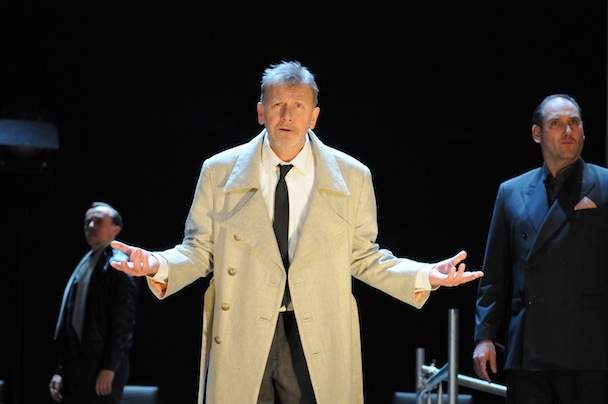Julius Caesar
Bell Shakespeare's slick and effective take on Julius Caesar speaks to modern executive government generally and the Kevin-to-Julia Labor leadership switch specifically.
Overview
Power in Shakespeare's Julius Caesar is brutal. It's corrosive and fleeting. It makes good people do bad things for their short-term survival, leads them to blur the public interest with their own. A manipulative entourage operates behind each visible figurehead. The citizenry's patience is short and their memory shorter. They martyrise their last despot not long after rejoicing in his removal by another. Their favour sways like a rope bridge over a gusty ravine.
Sound familiar? The Bell Shakespeare Company thought so, too, which is why their slick and effective take on Julius Caesar speaks to modern executive government generally and the Kevin-to-Julia Labor leadership switch specifically. By keeping the allusions from getting petty or gimmicky, they pull off the production with grace and resonance and built it up to possibly the best Caesar you'll have the pleasure to see.
The set is ringed by steel-framed meeting-room chairs and oversized spotlights; the cold corporate aesthetic interrupted only by the presence of a ruined Roman column bursting through the floor (which has a point, you'll see). There's shoe throwing and Q&A-style discourse, and the abridged script emphasises imagery of "the faction" and conspirators with "faces hidden in their cloaks" that were sketched 400 years before we made a cliche of 'faceless men'. Brutus (Colin Moody), Cassius (Kate Mulvany) and their supporters begin moving against tyrannical old Caesar (Alex Menglet) in a gently paced first half before the infamous execution scene is split by intermission. You're then dropped into a relentless and regularly jaw-dropping second hour where the set comes alive with a mesmerising assemblage of scaffolding, two great orators battle for the audience's hearts, and there's much navel-gazing on the part of the losers as they get their comeuppance at the Battle of Philippi.
There are some great performances here, particularly from Mulvany (who's also the excellent dramaturg). Making one of the key political players female proves an instant way to modernise the play, and disregarding gender, she is a brilliant Cassius bitter, sharp and determined. With regard to gender, it creates an interesting opportunity to play with sexual power and subtly question how we see women in positions of authority.
Director Peter Evans and the creative team have had a clearly conceived idea of what this show should be and proceeded to impressively execute it. The drama features some strong choreography, including explosive fights. Where most Caesars have chosen to swim in blood, this one marks its wounds with movement and white chalk dust it's bloodless, in fact. Like in modern politics and warfare, this violence is clean and distant. It doesn't get its hands dirty, and it's more disturbing for it.





